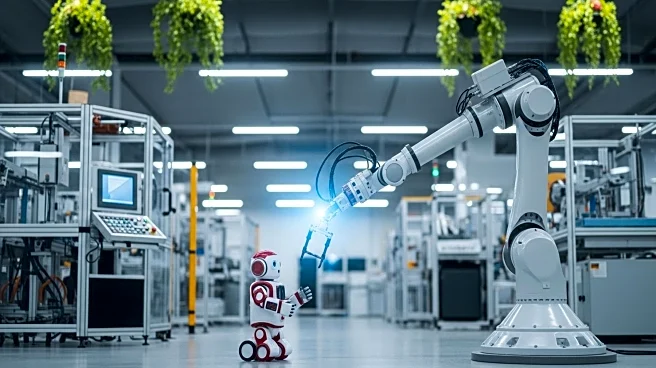What is the story about?
What's Happening?
The global industry is facing a significant labor shortfall, with projections indicating a deficit of over eight million workers by 2030. In response, companies are increasingly focusing on attracting younger generations, specifically Gen Z and Gen Alpha, to fill this gap. This shift is accompanied by efforts to modernize factories and integrate digital technologies, such as AI, robotics, and cloud computing, to streamline production and reduce energy consumption. The industry is also addressing the 'digital skills gap' by upskilling current employees to keep pace with rapid technological advancements. The emphasis is on appealing to younger workers who are adept in technology and innovation, which are crucial for the transition to net-zero greenhouse gas emissions.
Why It's Important?
This development is crucial as it highlights the industry's need to adapt to a changing workforce landscape and the growing importance of sustainability. By targeting Gen Z and Gen Alpha, industries aim to harness the technological prowess and innovative mindset of these digital-native generations. This shift not only addresses the labor shortage but also aligns with broader environmental goals, as younger workers are often motivated by meaningful work that contributes to lasting change. The integration of digital technologies and sustainable practices is expected to enhance operational efficiency and drive economic growth, while also meeting the demands of a more environmentally conscious workforce.
What's Next?
Industries are likely to continue investing in digital transformation and sustainability initiatives to attract and retain young talent. Companies may also increase their presence on digital platforms and engage with influencers to better communicate the benefits of working in modernized industrial sectors. Collaboration among manufacturers, technology providers, and governments will be essential to reshape the image of heavy industry as a symbol of innovation and environmental responsibility. This approach aims to secure the talent needed for future growth and sustainability.
Beyond the Headlines
The focus on Gen Z and Gen Alpha also reflects a broader cultural shift towards valuing work that has a positive impact on society and the environment. This trend could lead to long-term changes in how industries operate and engage with their workforce, potentially influencing public policy and educational programs to better prepare future generations for careers in sustainable industries.















